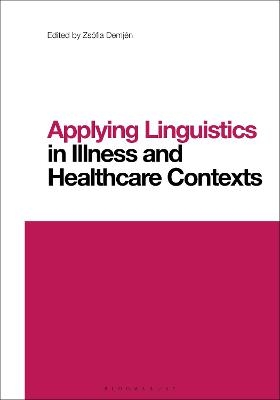
Applying Linguistics in Illness and Healthcare Contexts
Bloomsbury Academic (Verlag)
978-1-350-24712-3 (ISBN)
The chapters in this volume bring together applied linguistic work using discourse analysis, corpus methods, conversation analysis, metaphor analysis, cognitive linguistics, multiculturalism research, interactional sociolinguistics, narrative analysis, and (im)politeness to make sense of a variety of international healthcare contexts and situations. These include:
-clinician-patient interactions
-receptionist-patient interactions
-online support forums
-online counselling
-public health communication
-media representations
-medical accounts
-diagnostic tools and definitions
-research interviews with doctors and patients
The volume demonstrates how linguistic analysis can not only improve understandings of the lived-experience of different illnesses, but also has implications for communications training, disease prevention, treatment and self-management, the effectiveness of public health messaging, access to appropriate care, professional mobility and professional terminology, among others.
Zsófia Demjén is Associate Professor of Applied Linguistics at the Centre for Applied Linguistics, University College London, UK.
List of Figures
List of Tables
Notes on Contributors
Acknowledgements
Introduction, Zsófia Demjén
Part I: The experience of illness
1. “One gives bad compliments about me, and the other one is telling me to do things” – (Im)Politeness and power in reported interactions between voice-hearers and their voices, Zsófia Demjén, Agnes Marszalek, Elena Semino and Filippo Varese
2. Corpus linguistics in illness and healthcare contexts: a case study of diabulimia support groups, Gavin Brookes
3. Using a comparative corpus-assisted approach to study health and illness discourses across domains: the case of postnatal depression (PND) in lay, medical and media texts, Karen Kinloch and Sylvia Jaworska
4. Applying corpus linguistics to a diagnostic tool for pain, Elena Semino, Andrew Hardie and Joanna Zakrzewska
Part II: Relating to each other
5. Improving HIV/AIDS consultations in Malawi: how interactional sociolinguistics can contribute, Rachel Chimbwete-Phiri and Stephanie Schnurr
6. Empathy displays in Dutch chat counselling: showcasing a microanalysis of online data, Wyke Stommel and Joyce Lamerichs
7. The functions of narrative passages in three written online health contexts, Franziska Thurnherr, Marie-Thérèse Rudolf von Rohr and Miriam A. Locher
Part III: Illness in the mass media
8. Fighting obesity, sustaining stigma: How can critical metaphor analysis help uncover subtle stigma in media discourse on obesity, Dimitrinka Atanasova and Nelya Koteyko
9. A media brew of implied, hidden and unknown risk claims: cognitive discourse analysis of public health communication, Chris Tang and Gabriella Rundblad
Part IV: Professional practices and concerns
10. Effective triaging in general practice receptions: a conversation analytic study, Rein Sikveland and Elizabeth Stokoe
11. A sociolinguistic investigation of professional mobility and multicultural healthcare communication, Olga Zayts and Mariana Lazzaro-Salazar
12. Applying corpus-based discourse analysis to enhance understanding of barriers to palliative and end of life care provision in General Practice, Joelle Loew, Sarah Mitchell, Katharine Weetman, Catherine Millington-Sanders and Jeremy Dale
13. A moment outside time: a critical discourse analytic perspective on dominant constructions of suicide, Dariusz Galasinski and Justyna Ziólkowska
Epilogue, Jonathon Tomlinson
Index
| Erscheinungsdatum | 06.04.2022 |
|---|---|
| Reihe/Serie | Contemporary Studies in Linguistics |
| Verlagsort | London |
| Sprache | englisch |
| Maße | 169 x 244 mm |
| Themenwelt | Geisteswissenschaften ► Sprach- / Literaturwissenschaft ► Sprachwissenschaft |
| Medizin / Pharmazie ► Allgemeines / Lexika | |
| ISBN-10 | 1-350-24712-X / 135024712X |
| ISBN-13 | 978-1-350-24712-3 / 9781350247123 |
| Zustand | Neuware |
| Informationen gemäß Produktsicherheitsverordnung (GPSR) | |
| Haben Sie eine Frage zum Produkt? |
aus dem Bereich


